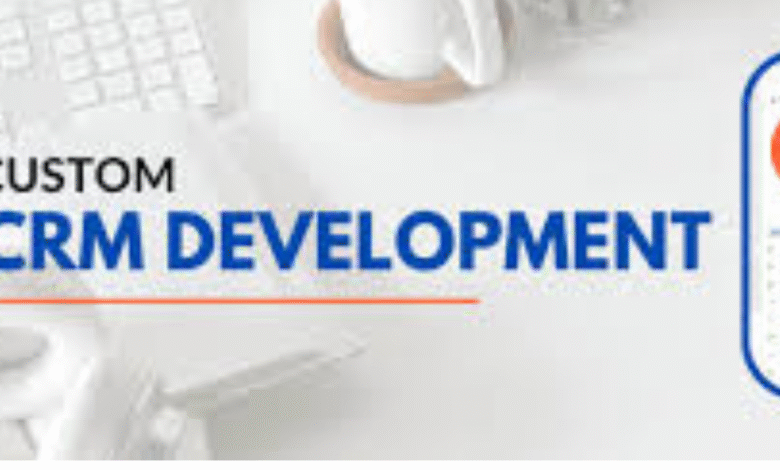Unleash Growth with a Bespoke CRM Crafted Just for You

In today’s hyper-competitive business environment, managing customer relationships effectively is no longer optional—it’s mission-critical. This is where a custom CRM development company steps in, offering tailored solutions that align perfectly with your unique sales processes, marketing strategies, and customer-service workflows. Unlike off-the-shelf platforms, a bespoke Customer Relationship Management (CRM) system can adapt dynamically as your business evolves, ensuring you capture every lead, streamline operations, and deliver exceptional experiences. Partnering with the right development team means investing in a solution built around your specific goals, data structures, and integrations—maximizing ROI and unlocking new growth opportunities from day one.
1. What Is a Custom CRM?
A custom CRM is a software platform designed and built from the ground up to meet the precise requirements of a particular organization. Rather than conforming to the rigid feature set of generic, mass-market CRMs, a custom solution:
- Implements Your Unique Processes: Every business has its own way of handling leads, opportunities, and support cases. A custom CRM follows your workflow diagrams, approval chains, and sales stages exactly.
- Integrates Seamlessly: Off-the-shelf systems often struggle to connect with legacy databases, specialized third-party tools, or in-house applications. Custom development ensures smooth, reliable data flows.
- Offers Unmatched Flexibility: As your business grows or pivots, you can add modules, tweak user interfaces, and reconfigure business logic without waiting for vendor updates or paying for expensive add-ons.
- Enhances Security and Compliance: An in-house or privately hosted CRM can be architected to meet strict industry regulations (e.g., GDPR, HIPAA, PCI-DSS), with customized authentication, encryption, and audit-trail functionality.
2. Benefits of Custom CRM vs. Off-the-Shelf
| Aspect | Off-the-Shelf CRM | Custom CRM |
| Fit to Business | Generic workflows; may require workarounds | Exact match; built for your processes |
| Scalability | Limited by vendor’s roadmap | Infinite, as long as you invest |
| Integration | Often via middleware or API limits | Direct integration with any system |
| Cost Structure | Subscription fees + paid add-ons | One-time development + maintenance |
| Customization | Constrained by platform capabilities | Unlimited code-level customization |
| Data Ownership | Hosted in vendor’s cloud | Owned and hosted as you choose |
Tailored User Experience: Your sales reps and support teams work the way they’re used to, boosting adoption and reducing training costs.- Full Control Over Roadmap: You decide which features come next, ensuring alignment with strategic priorities rather than waiting in a vendor backlog.
- Lower TCO Over Time: While initial development costs may be higher, eliminating recurring subscription fees and paying only for what you need can deliver significant long-term savings.
- Competitive Advantage: Custom dashboards, predictive analytics, or AI-powered lead scoring—innovations that set you apart from rivals still stuck on vanilla CRM solutions.
3. Key Features of a Custom CRM
When partnering with a custom CRM development company, you can include exactly the modules and functionality your organization requires. Common building blocks include:
- Lead Management & Scoring: Capture prospects from web forms, social media, and events, then apply custom scoring algorithms to prioritize follow-ups.
- Opportunity Tracking & Forecasting: Visual pipelines with deal stages, probability adjustments, and revenue projections tailored to your sales cycle.
- Contact & Account Management: Rich, centralized profiles with custom fields, relationship maps, and communication logs.
- Workflow Automation: Automated email sequences, task assignments, approval requests, and escalation paths based on your business rules.
- Reporting & Analytics: Custom dashboards and reports that surface KPIs relevant to your teams—conversion rates, churn analysis, campaign ROI, and more.
- Mobile & Offline Access: Responsive design or native apps enabling your field force to update records on the go, even without a network connection.
- Security & Permissions: Granular role-based access controls, single sign-on (SSO), two-factor authentication (2FA), and audit logs.
- Third-Party Integrations: Native or API-driven links to ERP, marketing automation, e-commerce, support ticketing, accounting, and data warehouses.
- Custom Extensions: Niche modules like territory management, partner portals, subscription billing, or compliance tracking.
4. The Custom CRM Development Process
A reputable custom CRM development company will follow a structured methodology to ensure your project stays on time, on budget, and on scope:
4.1. Discovery & Requirements Gathering
Workshops, stakeholder interviews, and process mapping sessions to define functional requirements, data models, integration points, and security needs.
4.2. Solution Design & Architecture
High-level system architecture, technology stack selection (e.g., .NET, Java, Node.js, Python), database schema, and API design—balancing performance, scalability, and maintainability.
4.3. Prototyping & UX/UI Design
Click-through prototypes and wireframes for all major screens. Iterative feedback loops ensure the interface is intuitive for end users before development begins.
4.4. Agile Development
Breaking the project into sprints (typically 2–4 weeks), with working increments delivered at each milestone. Frequent demos keep stakeholders aligned.
4.5. Quality Assurance & Testing
Automated unit tests, integration tests, user acceptance testing (UAT), performance/load testing, and security audits to catch issues early.
4.6. Deployment & Training
Production rollout—whether on-premises, in your private cloud, or on a secure public cloud environment. User training sessions, documentation, and knowledge transfer to your IT team.
4.7. Support & Maintenance
SLAs for bug fixes, feature enhancements, and ongoing monitoring. Regular health checks, security patches, and version upgrades keep your system robust.
5. Choosing the Right Partner
Not all development firms are created equal. When evaluating potential partners, consider these criteria:
| Criterion | What to Look For |
| Domain Expertise | Experience in your industry (e.g., manufacturing, finance, healthcare) |
| Technical Skills | Proficiency in your chosen tech stack, API frameworks, and DevOps practices |
| Portfolio & Case Studies | Proven track record of CRM projects, ideally with measurable ROI |
| References & Reviews | Client testimonials, third-party ratings, and peer recommendations |
| Project Management Rigor | Agile/Scrum certifications, transparent reporting, and milestone governance |
| Cultural Fit & Communication | Responsive, English-fluent teams; overlap in time zones; collaborative mindset |
| Security & Compliance | ISO 27001, SOC 2, GDPR, HIPAA expertise as relevant to your needs |
| Post-Launch Support | Clear SLAs, support models (onsite, remote, 24/7), and long-term partnership vision |
Red Flags to watch out for:
- Vague or one-size-fits-all proposals
- Lack of detailed timelines, deliverables, or cost breakdowns
- Offshore teams without clear communication protocols
- No demo of past CRM work or unwillingness to share references
6. Case Studies & Industry Examples
6.1. B2B Software Provider
Challenge: Generic CRM lacked product-usage analytics and complex multi-tier partner management.
Solution: Custom modules for usage data ingestion, partner tier rules engine, and co-selling dashboards.
Result: 30% faster deal closure, 20% boost in partner-driven revenue within six months.
6.2. Retail Chain
Challenge: Disparate loyalty-program data across POS systems, e-commerce, and call centers.
Solution: Centralized contact profiles, real-time sync with POS terminals, and custom loyalty-points rules.
Result: 15% increase in repeat purchases, 25% uplift in email campaign engagement.
6.3. Professional Services Firm
Challenge: Manual proposal and contract creation slowed sales cycles.
Solution: Automated document generation with pre-approved clauses, e-signature integration, and audit logs.
Result: 40% reduction in proposal turnaround time; improved compliance and auditability.
7. Cost Considerations and ROI
Initial development costs for a custom CRM can range widely—typically $50,000 on the low end for a basic MVP up to $500,000+ for enterprise-grade, feature-rich implementations. Key cost drivers include:
- Number and complexity of modules
- Integration points and API work
- Data migration effort from legacy systems
- Level of automation and AI/analytics
- Security, compliance, and hosting requirements
- Ongoing support and enhancement retainer
ROI Drivers:
- Reduced License Fees: Eliminate per-user, per-module subscription costs.
- Increased Productivity: Automated workflows and custom dashboards save hours of manual effort each week.
- Higher Conversion Rates: Tailored lead-scoring and follow-up campaigns drive more closed deals.
- Improved Customer Retention: 360° customer views and proactive service prevent churn.
Many organizations recoup their initial investment within 12–18 months through operational efficiencies and revenue growth.
8. Scaling & Long-Term Evolution
A custom CRM is not a “set it and forget it” project. To maximize its lifespan:
- Modular Architecture: Ensure new features can be plugged in without massive rewrites.
- DevOps & CI/CD Pipelines: Automate builds, tests, and deployments to accelerate delivery.
- Regular Health Checks: Quarterly reviews of performance, security, and compliance.
- User Feedback Loops: In-app surveys or periodic workshops to capture enhancement requests.
- Budget for Enhancements: Allocate roughly 10–20% of the initial project cost annually for upgrades and new modules.
By treating your CRM as a living system, you’ll continue to innovate—adding AI-driven insights, chatbots, voice integrations, or blockchain-based audit trails as technology advances.
Conclusion
A custom CRM development company is your strategic partner for building a solution that evolves with your business—no more bending your processes to fit a pre-packaged product. From discovery and design through agile development and ongoing support, a specialized development team ensures you get a CRM that drives efficiency, fosters stronger customer relationships, and generates measurable ROI. With the right custom CRM in place, you’ll streamline operations, empower your teams, and position your organization for sustained growth in an increasingly customer-centric marketplace.




